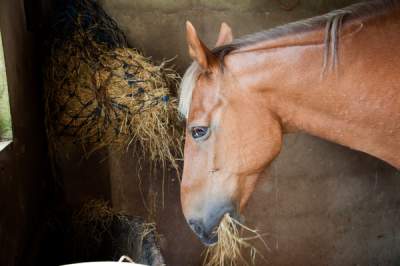 Ulcers are a silent yet prevalent medical condition in horses. According to most studies, ulcers are said to be present in 60% of show horses, and up to 90% of racehorses. So why do we hear so little about them? It may be because our horses aren’t letting us know they are in pain. Horses are prey animals; and it is their natural instinct to hide discomfort. This leads to many ulcer cases going undiagnosed and horses living in pain.
Ulcers are a silent yet prevalent medical condition in horses. According to most studies, ulcers are said to be present in 60% of show horses, and up to 90% of racehorses. So why do we hear so little about them? It may be because our horses aren’t letting us know they are in pain. Horses are prey animals; and it is their natural instinct to hide discomfort. This leads to many ulcer cases going undiagnosed and horses living in pain.
In 2011, Danish researchers revealed the findings of a study that observed the behaviors of 98 horses. Of the 98, 33 had at least one severe grade ulcer, grading 3 or 4 out of 4. Another 30 horses had at least one lesion in the lower region of the stomach. “There was surprisingly little difference (in behavior) between groups of horses with and without severe gastric ulceration from the same stable, fed equal amounts of starches and hay,” said Jens Malmkvist, PhD.
The only recognizable behavior difference was in eating habits. This study found that horses with ulcers have a tendency to eat their food faster when they are not fed on time although horses can present various changes in eating habits as eating can be painful. This may be because horses produce about 1.5 liters of stomach acid per hour. When the stomach is empty, this acid can begin to irritate the ulcer and cause additional pain.
So why do so many horses have ulcers? It may be are result of how a horse deals with stress. In the study, researchers monitored heart rate and cortisol levels of the horses after showing them new objects and feeding them 1 hour later than normal. Those horses with ulcers had a greater endocrine response (endocrine is a gland which produce hormones), elevating the levels of cortisol. Cortisol is the “stress hormone” this elevated cortisol may be an indicator of ulcer-prone horses.
When it comes to ulcers, don’t let your horse’s good behavior fool you. Ulcers are painful. If your horse is routinely put in stressful situations (showing, trailering, trail riding in new places, etc.) it may be in your horse’s best interest to have it scoped for ulcers.
Contact Mid-Rivers today to schedule a gastroscopy exam for your horse.